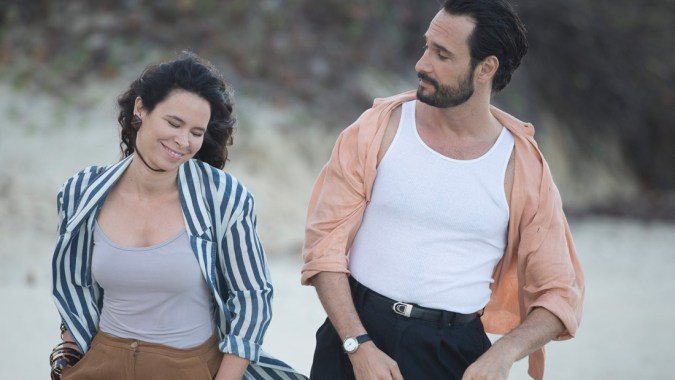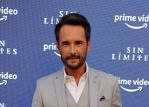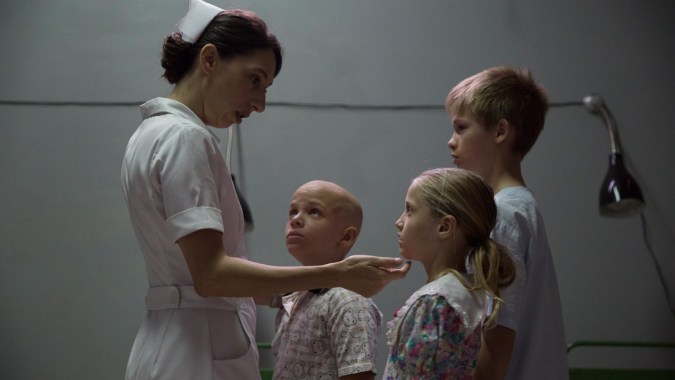Performances like his now iconic take on Xerxes, the jewelry-laden king of Persia in the 300 films, or as Cuba’s current leader, Raúl Castro, in Steven Soderbergh’s two-part epic Che; are undeniable proof that Brazilian actor Rodrigo Santoro has never been afraid to step out of his comfort zone. But in spite of this willingness to immerse himself in remote universes, whether real or fantastical, the linguistic and emotional trials that his latest lead role presented were frightening for him at first. For Un Traductor, a Cuban production by directors Sebastián Barriuso and Rodrigo “Rocco” Barriuso, Santoro had to perfect his Spanish and deliver it with a Cuban accent, but that was the easy part. Learning Russian was the real obstacle.
Santoro stepped into the shoes of a fictionalized version of the directors’ father, who was a Russian literature professor in Havana when the Cuban government took in a large number of people affected by the Chernobyl nuclear disaster, in the former Soviet Union, to be treated in the island’s hospitals. Malin, the name given to Santoro’s character in the film, is recruited as an impromptu translator by the Cuban government. His skills in the Russian language make him one the most qualified people to help doctors communicate with patients; however, the stakes become exponentially higher when Malin,a husband and father, learns that he has been assigned to interpret for the Soviet children affected. The emotional toll and time commitment of his unwanted new job put strain on his marriage and his relationship with his own young son.
Determined to shoot on location in Havana, the Barriuso brothers endured all the hurdles that come from making a film in a developing country that has been closed off to the outside world for half a century, including the fact that they were forced to import certain equipment from Canada, where they now reside. Santoro was taken back to Cuba over a decade after playing Fidel’s brother, and discovered a people in transition grappling with their new reality. Although the filmmakers did not ask him to take on their father’s mannerism or to replicate his personality, he felt responsible for bring to life a sincere depiction of the experiences that the real character had undergone. It’s a juicy role.
Getting over his fear of hospitals, ditching Portuguese for Russian and Spanish with a Cuban accent, plus having to postpone his surfing vacation to take the role were among the topics the Brazilian thespian addressed during a chat with Remezcla at the Sundance Film Festival. Here are the highlights.

On Deciding to Make the Film Despite Being Brazilian
The project arrived at a very strange time because I was planning to take a vacation. I was exhausted and I was going to go surfing. I got the screenplay and I immediately fell in love with it. I had no idea this had happened. I knew about Chernobyl, but not about the connection with Cuba. Then I found out the screenplay was based on a true story. The screenplay stayed in my mind and I kept on trying to sabotage it by saying to myself, “No I’m not going to do it. I can’t do this now.” But it continued to be in my mind. We had a meeting in Miami, where I was working. Sebastian lived there and Rocco flew from Toronto. We met and I asked them, “This is a movie about a Cuban professor of Russian Literature, why are you guys looking for a Brazilian? I speak Portuguese compadre.” We started talking about that and they told me they had seen me in Che and thought my Spanish was good. They told me we could work on the Spanish, but that I had to learn Russian.
On Getting the Cuban Accent Right
When it came to the Cuban accent, I was a bit familiar with it because when I made Che my Spanish dialect coach was Cuban, so I worked a bit with that accent. The moment we agreed to make the movie I called the same coach, his name is Armando Suarez, a Cuban man who lives in New York. We started working via Skype on the accent. Also, the two directors are Cubanisimos, they live in Canada but they are very Cuban, so on the set we were working on the accent the whole time, “This little word here, and this other one there.”

On the Frightening Challenge That Learning Russian Entailed
The Russian language was an enormous and frightening challenge, but the story was so powerful and touched me so deeply. There was fear and phantasmagorical ideas that making a film in Russian is a risk because it would put me in a box and I wouldn’t be free to do much, but the story really moved me and I decided to make it. I studied Spanish in the morning, and in the evening I would study Russian. Naturally, Russian feels incredibly foreign. There is no way to find a reference to something close. It’s a completely different language. I looked at the lines I had to say in each scene and I worked with that. I made a pronunciation map or phonetic chart. I would listen and write in a way that only I could understand, but it worked for me. I would study what the other people in each scene would say to me in Russian. I made sure I understood everything that was being said first, and then I started to work on pronouncing the Russian dialogue. I’m very happy with what I did, when I saw the film for the first time I wasn’t paying attention to the Russian or Spanish languages, I was focused on the story and the characters. It seems like it worked because it premiered at Sundance and the audience reception has been very beautiful

On Returning to Cuba to Shoot the Film and Seeing a Country in Transformation
I have two visions of Cuba. The first time I was there was in 2006 and that was the old Cuba. Now, the Havana I saw was a Havana in transformation, with more access to the Internet and more opened to the world. I was disconnected from the Internet when I was there because I was working, but there was a plaza that was close to where I was staying, which had an antenna and people there, young and old, were communicating thanks to technology. I think the transformation Cuba is experiencing is huge. It’s not only external, but also internal, the Cuban people are opening up to the world. The Internet is a way of building this connection. There are multiple transformations happening right now in Cuba. We’ll have to wait and see what happens with the elections. It’s difficult to try to define how Cuba is doing now because I believe this is the greatest transformative process of its history, which started a couple years ago with Fidel Castro’s death. I think that in a couple of years we will understand where Cubans stand.
On Getting Over His Dislike for Hospitals
Shooting this movie was very intense. I personally have a problem with hospitals and that’s one of the things I told Rocco, “I have to study Spanish, learn Russian, portray this character that has such an emotional and intense journey, and on top of that I have to be in a hospital at night in the section where they treat children?” There were many challenges and hospitals are still a place I’m not comfortable with. Every time I go into a hospital I have to take a deep breath because I don’t like them, but I have to say my vision of them has changed a bit because of the movie. I’ve always had this sensation that when I go into hospitals it’s because something can go wrong. Now I think of them as places that help someone that is not doing well get better.

On Immersing Himself in Cuban and Russian Culture for the Role
Personally, I had to immerse myself in this world, starting with literature, because of the character, which is the directors’ father. When I started talking to him via Skype he told me about many classic Russian novels, some I had read, and many others I had not. Then there was Russian music and Cuban music. Through music and literature I went through a complete immersion. I still have that music in my playlist, because there are really beautiful songs. There were also Cuban movies I watched, many of which I hadn’t watched before. I nurtured myself with everything in that universe. I had a previous relationship with Cuba since Che, but this time around it was a real immersion.
On the Emotional Journey of Playing a Fictionalized Version of the Directors’ Father
I asked Manuel, the directors’ father, what he felt at different instances, “How was that for you? What went through your head at that moment?” I wanted to know what he thought about when he went to sleep alone, what his fears were, what the core conflict was. We talked a lot about all these things, but it was difficult for Manuel because this was his life. I felt he was slowly opening up to me, but in the end I understood that what he felt is a very difficult emotion to rationalize. What I did as an artist or as an actor was to be in those moments. I had a many scenes with children, and working with children is always a great challenge, but it’s also a gift because they give you so much in terms of presence. They are present in the scene. They are connected to what’s happening in the moment. It all made it a very emotional and profound journey for me. The fact that I was in a hospital and the fact that it deals with a real story, both because this happened to their father and because Chernobyl was the worst nuclear accident in the history of the world, made it even more important. I also remember that Magda, the directors’ mother, took me to an exhibit that was in Havana at the time about the Chernobyl victims, and that has stayed engraved in my mind forever. Everything in this movie was emotional for me.
This interview was conducted in Spanish and translated to English by the author for Remezcla.




